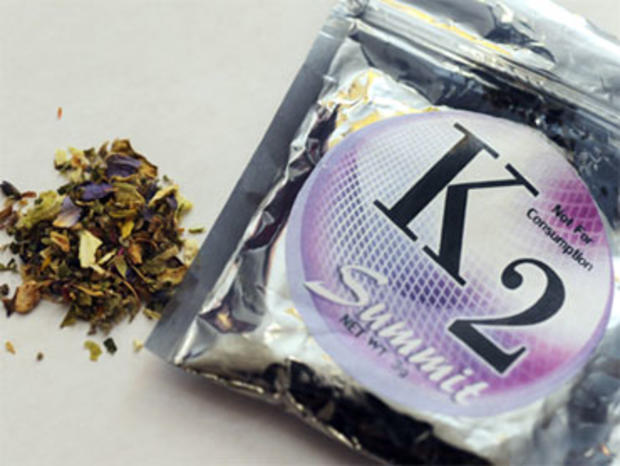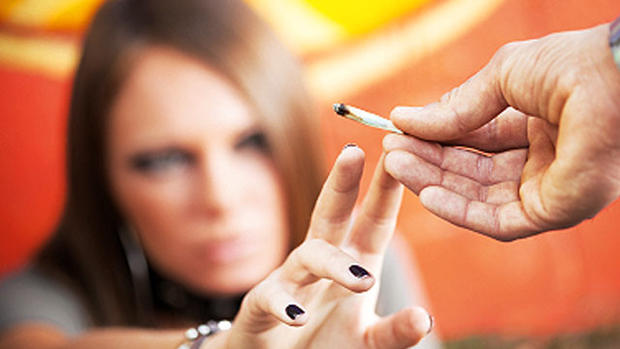Synthetic marijuana sending more teens to hospital, study finds
(CBS News) Synthetic marijuana is sending more kids and teens to the emergency room than ever before, according to the authors of a new study. Making matters even worse, emergency room doctors might not recognize the symptoms from these relatively new drugs, and may not realize some of these teens need immediate medical attention.
Marijuana use up, alcohol use down among U.S. teens: Report
"Synthetic marijuana" blamed for teen's death: What is it?
Toking teens: 17 top states for marijuana use
Synthetic marijuana is a mix of plants and chemicals that's sometimes sold as "potpourri" under the brand names K2, Spice and Blaze. According to the study, published in the March 19 issue of Pediatrics, The American Association of Poison Control Centers received 4,500 calls involving problems from synthetic marijuana between 2010 to 2011.
The researchers also reported an uptick in the number of teens reporting to emergency rooms after using the fake - but dangerous - drug. They detailed three cases of so-called "synthetic cannabinoid intoxication" for their study.
One case involved a 16-year-old girl who was "catatonic" with her eyes open, but not responding to verbal or painful cues to try and get her attention. Another looked at an 18-year-old boy who was agitated and sweating profusely, and the third case looked at a 16-year-old boy who presented to the ER hallucinating with a "frozen face" and slow speech.
The teens in the study were also found to experience symptoms such as agitation, aggression, excessive sweating, restlessness and an inability to speak.
One of the problems with synthetic pot is the drug doesn't show up on routine drug tests that might be given in a hospital setting. The researchers hope by sharing these stories, other doctors will be able to recognize signs of synthetic marijuana intoxication.
"When we suspected the use of synthetic marijuana in these patients, we soon realized that there is little information about this drug in the medical literature," study author Dr. Joanna Cohen, a pediatric emergency medicine physician at Children's National Medical Center in Washington D.C., said in a hospital written statement. "Because it is a relatively new drug, we should be aware of the symptoms and make a concerted effort to share our experiences in treating patients so we can develop best practices."
Dr. Robert Glatter, an emergency medicine physician at Lenox Hill Hospital in New York City who was not involved in the study, said the problem is compounded by the fact that these products contain unknown additives and chemicals which may cause a different set of physical symptoms. They include elevated blood pressure, rapid heart rates and paranoia - which could mimic a panic attack - along with hallucinations and even seizures for some users, he said. Effects of long-term use might be even worse.
"The truth is that we do not know the long term effects on the brain and nervous system in children and teens after use of synthetic cannabinoids," Glatter told HealthPop in an email. "With repeated use, potential side effects reported have included cognitive difficulties, including memory loss as well as psychosis."
Another problem: Teens with previous drug problems may also gravitate towards abusing synthetic marijuana, according to David Rotenberg, vice president of treatment at Caron Treatment Centers in Wernersville, Pa.
"Kids who have drug problems and are put on probation or are in an outpatient treatment program gravitate toward this stuff because it doesn't show up in all urine screens," Rotenberg told WebMD. "This stuff is bad news."
Cohen said emergency room physicians should consider using comprehensive lab tests that check the urine, blood and electrolytes for chemicals. She also said parents need to be aware of the symptoms and that teens experiencing signs of intoxication should get immediate medical attention.
According to a recent report from the Department of Justice, one in nine high school seniors used synthetic marijuana in the past year.
"Parents should talk to their children about this drug," Dr. Aaron Schneir, a toxicologist at the University of California in San Diego who was not involved with the study, told LiveScience. "You have no idea what you're getting when you use it."


